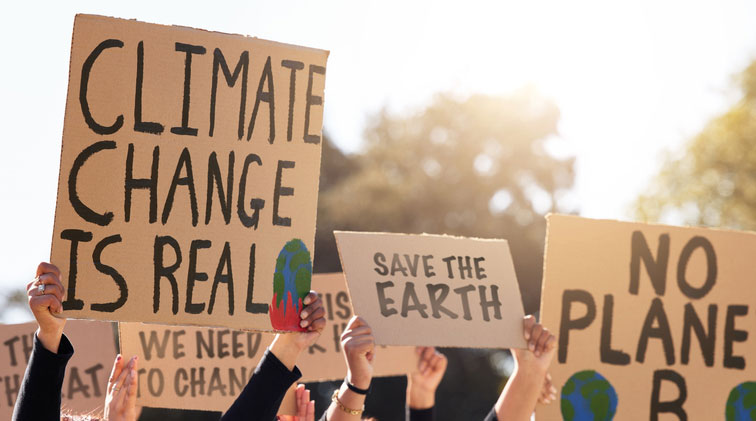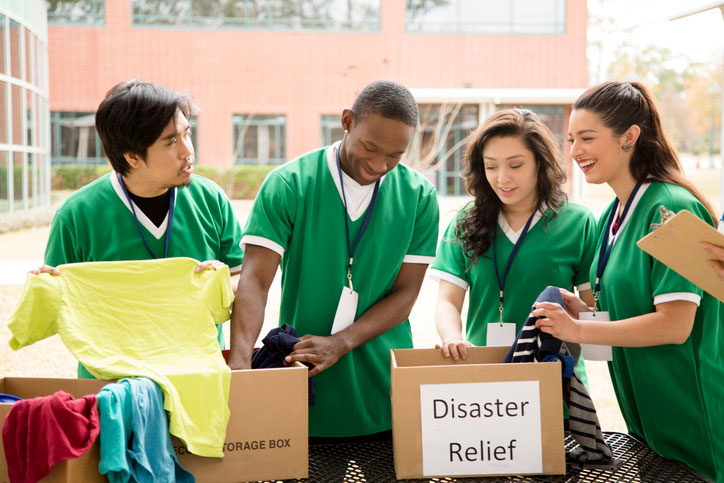Written by Jack Levinson

No matter who you are or where you are from, you are all but certain to have experienced the effects of climate change. However, for our society’s most disadvantaged, the impact of climate change has already proved to be a force of devastation, with risks that are poised to increase demonstrably in the years to come.
While many assume climate activism to be chiefly concerned with ecological damage in and of itself, there are many noble efforts being made to address the human side of the climate crisis, supporting and uplifting the people whose lives have already been impacted by global warming. Social workers are at the vanguard of this movement, equipped with the insights and resources to provide lasting support to those facing hardships as a direct result of environmental decay.
If you wish to be involved in efforts to repair our world in the face of the climate disaster, social work is a vital way to do so.
Featured Programs:Sponsored School(s)

This is because the efforts of social workers have long been focused on supporting people experiencing many of the concerns that climate change gives rise to: displacement and homelessness, threats to job security, health problems, migration, and more. In this way, social work is at the forefront of addressing the destruction of climate change we are already experiencing today, with insights and strategies that we will continue to rely on as our problems intensify.
So how does social work promote community and environmental sustainability? What does “environmental justice as social work practice” mean? Read on to find out everything you need to know about the importance of social work in the age of climate change.
Environmental Justice in Social Work
A foundational tenet of the social work profession is its commitment to not only ameliorating the situations of our society’s most vulnerable, but understanding the root causes of inequality in an effort to create a more just world. Indeed, as first responders and front-line witnesses of some of our country’s greatest inequities, social workers have contributed powerful insights that have helped illuminate how broad-scale phenomena impact the lived experiences of individuals, families, and communities.
Because of this, it comes as no surprise that social workers were among the first to recognize that the consequences of climate change have had their harshest impact on low-income demographics.
For underserved populations, climate change is not a looming threat of the future; it is an active danger that can determine day-to-day life.
Since much of the discourse surrounding climate change is focused on dramatic events like natural disasters, the public isn’t as aware of the ongoing devastation it has caused to low-income communities. (This is not to ignore the catastrophic impact natural disasters have on underprivileged communities as well; rather, it is to illustrate that the effects of climate change are perpetual, occurring in ways that are not always as stark as force majeure events.)
However, social workers, in their effort to identify the factors leading to increases in patterns of displacement and job insecurity, have rightly pinpointed climate change as an overwhelming element of present-day unrest. Recognizing this alone has been a crucial step in our understanding of the urgency of the climate crisis, motivating concerned and compassionate people to take action now.

The Role of Social Work in Environmental Protection
So how do social workers contribute to climate-related causes? It’s a question with more than one answer, depending entirely on the position and branch of the social work field that you work in.
Some social workers’ jobs are directly framed around climate-related causes, while others respond to seemingly independent issues that are nevertheless linked to global warming.
Those who work in disaster relief are directly engaged with environmental catastrophe, which is the unignorable force behind the devastating weather events that have accelerated worldwide over the past several decades. But there are other causes that have similarly transformed and intensified as a result of climate change, even if they are not always acknowledged as such.
Indeed, climate change is a factor behind a huge number of growing issues, from food inequality to patterns of gentrification. Those who are most vulnerable to these threats are the individuals and communities that have the fewest resources to maintain their health and quality of life – i.e., those who are already in positions of tremendous need.
Social workers have long been invested in improving the lives of those who are struggling, developing resources to assist people through a huge variety of hardships. In the face of the climate crisis, social workers have effectively instrumentalized these resources to support the communities hardest hit by environmental damage.
Case Study: Drawing the Connection Between Climate Change and Food Insecurity
As noted above, social workers have contributed meaningful insights into the links between climate change and seemingly unrelated causes. One such issue is food inequality.
Even prior to the escalation of the climate crisis, food insecurity was an issue faced by many underserved communities. As global warming has intensified, catastrophic weather events have wrought significant damage upon agricultural production, leading to food shortages. This in turn leads to higher prices of food, putting many dietary staples out of reach of low-income households.
Food insecurity is just one of many symptoms of climate change as it affects our most vulnerable, but it illustrates the roundabout ways that our environmental crisis has hit economically disadvantaged communities the hardest. Social workers, who often take responsibility for finding resources to help those struggling with food insecurity, were among the first to observe this in action, and their insight into this struggle has illuminated the ins and outs of this experience for policymakers and the community at large.
Environmental Social Work Jobs
As mentioned above, there is a range of social work jobs that engage with the climate crisis, some of them directly and others indirectly. Both forms of social work are meaningful and downright invaluable contributions to the fight against climate change; the one you choose should speak to your personal skills, interests, and the causes closest to your heart.
If what you’re looking for is a social work job that deals directly and explicitly with climate related causes, consider the following job titles:
- Disaster response worker. Those who wish to engage with the climate crisis head-on will find this career path to be the one most suited for their goals. Disaster response workers provide immediate support to those who have been impacted by natural disasters, from facilitating emergency resources to providing counseling to overseeing long-term rehabilitative measures to help struggling individuals and families get back on their feet.
- Environmental justice advocate. Experienced social workers – especially those who have been involved in disaster relief efforts – can channel their expertise into impactful careers as environmental justice advocates, drawing from their experiences to help direct legislation at the local, state, and federal levels to supporting the communities hardest hit by climate change.
- Sustainability coordinator. Beyond making efforts to help those impacted by climate change, many in the social work profession are invested in revising existing protocols and plans so that they are as green as possible. If you are a systems-oriented thinker with a desire to put your talents toward environmentally friendly action, this is the job for you.
- Community organizer. Though not always an explicitly environmentally-focused role, community organizers work to understand the greatest needs of those they engage with. In circumstances when climate change is a significant factor, they can often act as champions of green causes, helping to uplift and support struggling communities.
These are just a few of the top social work roles that are directly tied to climate justice efforts. That said, since the impacts of climate change are so wide-ranging, many other forms of social work also provide critical relief to those who have been impacted by environmental decay.

Requirements to Become an Environmental Crisis Social Worker
No matter what branch of social work you choose to get involved in, your core requirements will be the same.
All social workers in Texas must possess a Master of Social Work degree in order to obtain their social work license.
Further, it is not possible to hold a social worker position in any type of social work organization without your license. This means that attending a graduate program is the necessary first step of any social worker’s career path.
FAQs
What is environmental social work?
There are many types of social work that deal with environmental causes. Some of these are overt, such as disaster relief social work. Others deal with the ramifications of climate change rather than environmental concerns themselves, focusing on issues like displacement, health concerns, food inequality, and more. In this way, many forms of social work can fall under the umbrella of environmental justice efforts.
Do I need to study environmental science to contribute to climate justice efforts as a social worker?
Certainly not. Many social workers engaged in environmental justice are drawn to the human side of the climate crisis, putting their efforts toward helping individuals and families whose lives have been upended by global warming. This can be a wonderful way for those who aren’t necessarily scientific thinkers to participate in climate activism in a way that makes use of their natural skills and abilities.
What degree do I need to become an environmental crisis social worker?
In the state of Texas, all social workers need to hold a Master of Social Work degree from an accredited institution. With this degree, you will be eligible to pursue your state social work license. For more information on license types and requirements, take a look at our guide here.
How do social work efforts contribute to climate activism?
Above all else, social workers have contributed to climate justice efforts by advocating on behalf of vulnerable communities whose lives have already been dramatically impacted by climate change. Since social workers respond to the needs of underserved populations, they often are witness to the lived consequences of climate change in ways that many other people are not. Because of this, social workers have a tremendous voice in discussions of the climate crisis, offering hard-hitting insights into the destructive effects of global warming on our society’s most vulnerable.







